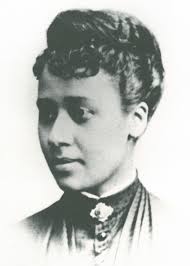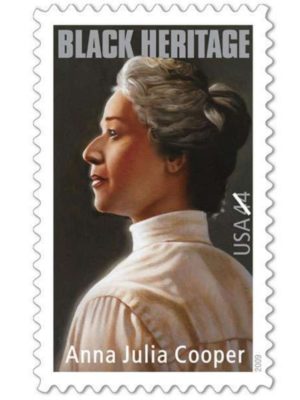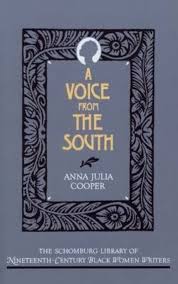“It is not the intelligent woman v. the ignorant woman; nor the white woman v. the black, the brown, and the red, it is not even the cause of woman v. man. Nay, tis woman’s strongest vindication for speaking that the world needs to hear her voice.”

Anna Julia Cooper is regarded as one of the most noted African American intellectuals in history. However, her name is not as popularly known as her male counterparts of the same era such as Booker T. Washington and Frederick Douglass. Her life is one of perseverance, determination, and triumph over adversity. One can only imagine that she must have been tenacious and dedicated to her principles. She was born in 1858 to an enslaved mother and her white slaveholder. She spent her life educating black youth and advocating for black women. Cooper was the fourth African American to earn a Ph.D. – and did it all while raising five children that she adopted after her brother died. The Anna Julia Cooper Center at Wake Forest University gives a summary of her biography:

US Postal Service 2008
“…Anna Julia Cooper spent her lifetime of over a century redefining the limitations and opportunities for women of color in a society set up for their disempowerment and subjugation. A distinguished scholar and educator, Cooper saw the status and agency of black women as central to the equality and progress of the nation.
Cooper received her B.A. from Oberlin College in 1884, and then returned to earn a M.A. in mathematics in 1887. After attaining her degree, Cooper moved to Washington, DC and was recruited to work at Washington Colored High School, or M Street School, the only all-black school in DC. [Eventually promoted to principal,] Cooper rejected her white supervisor’s mandate to teach her students trades, and instead trained and prepared them for college. Cooper sent her students to prestigious universities and attained accreditation for M Street School from Harvard, but her success was received with hostility rather than celebration from a power structure that was not necessarily interested in the advancement of black youth.”
“The cause of freedom is not the cause of a race or a sect, a party or a class-it is the cause of human kind, the very birthright of humanity.”

Published 1892
Cooper was a Christian who believed that the teachings of Jesus were a clear instruction for the equality of men and women. In her landmark A Voice from the South, she writes “By laying down for women, the same code of morality, the same standard of purity as for men…[Jesus] has given men a rule and guide for the estimation of woman as an equal, as a helper, as a friend, as a sacred charge to be sheltered and cared for with a brother’s love and sympathy.” In this text, she also discusses how women of color exist at an intersection of oppression. She argues that the progress of women of color will be a benchmark for the progress of the nation. The Wake Forest summary characterizes the legacy of Cooper’s voice as very relevant to the struggles of women, particularly women of color, into the present day.
“One needs occasionally to stand aside from the hum and rush of human interests and passions to hear the voices of God.”
“In a place and time largely unreceptive to the needs of people of color and women, Cooper broke barriers and insisted that her voice as a black woman from the south be heard and acknowledged. Her accomplishments and vision have helped not only make Cooper one of the most noted African-American intellectuals in the history of the nation, but have helped reframe the understanding of intersections of race and gender and their political, cultural and personal implications in pursuit of a better nation.”
“I speak for the colored women of the South, because it is there that the millions of blacks in this country have watered the soil with blood and tears, and it is there too that the colored woman of America has made her characteristic history and there her destiny is evolving.”